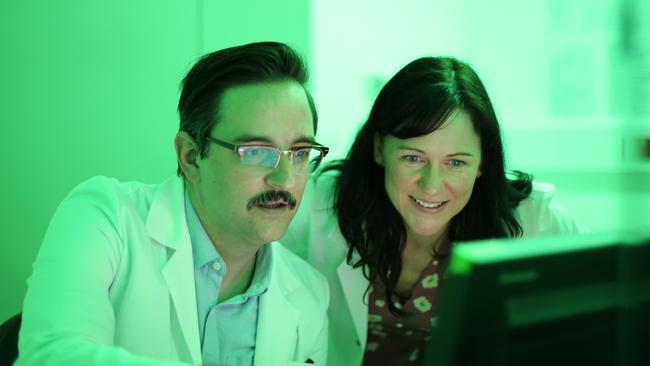Melbourne scientists searching for new ways to fight chronic pain
Melbourne scientists are developing new ways to block pain by re-engineering drugs to hit targets inside the nerve cells in the spine.

VIC News
Don't miss out on the headlines from VIC News. Followed categories will be added to My News.
Melbourne scientists are developing new ways to block pain by re-engineering drugs to hit targets inside the nerve cells in the spine.
New, potent and long-lasting pain relief medications are desperately needed to help the estimated 20 per cent of Australians suffering chronic pain.
“There is currently an opioid epidemic,” said Dr Nicholas Veldhuis, from the Australian Research Council Centre for Bio-Nano Science.
STEM CELL INJECTION BETTER THAN PLACEBO FOR BACK PAIN
MEDIBANK HOSPITAL SURVEY FINDS PATIENTS LEFT IN PAIN
“These painkillers have problematic side effects, such as addiction and tolerance, so we need to develop new drugs to relieve pain.”
Research internationally and in Melbourne is helping to achieve this ambitious goal.
When people experience pain, for instance touching a hot stove, chemical messengers called neurotransmitters send pain signals to the spine and the brain.

They “talk” to tiny receptors sitting on the surface of nerve cells in the spine waiting to receive messages.
Traditional pain drugs target these receptors, but Dr Veldhuis, who is also from the Monash Institute of Pharmaceutical Sciences, said scientists discovered when these receptors received information at a cell’s surface, some of them actually moved into the inner chambers of the nerve cell.
BREAKTHROUGH COULD DELAY NEED FOR HIP, KNEE REPLACEMENTS
This manoeuvre may help them evade current pain relief medication.
Together with collaborations at Columbia University and the Monash Biomedicine Discovery Institute, the team are now developing new types of drugs and re-engineering existing ones to go inside the nerve cell.
The aim is for the drug to stop the receptors from telling the brain about the pain.

While still in early preclinical and animals studies, Dr Veldhuis said their preliminary studies indicated this approach was effective.
The most recent study, published in the Proceedings of the National Academy of Sciences, reveals blocking one of the key pain receptors responsible for migraine and other pain conditions was like “putting a handbrake on spinal neurons and persistent pain”.
Macquarie University’s Professor Mark Connor, an independent expert in pharmacology, said the discovery a few years ago that the receptors moved inside the cell and continued to signal was an important and interesting concept.
“This is a new avenue for potentially blocking their activity, which could be useful for pain relief,” Prof Connor said


